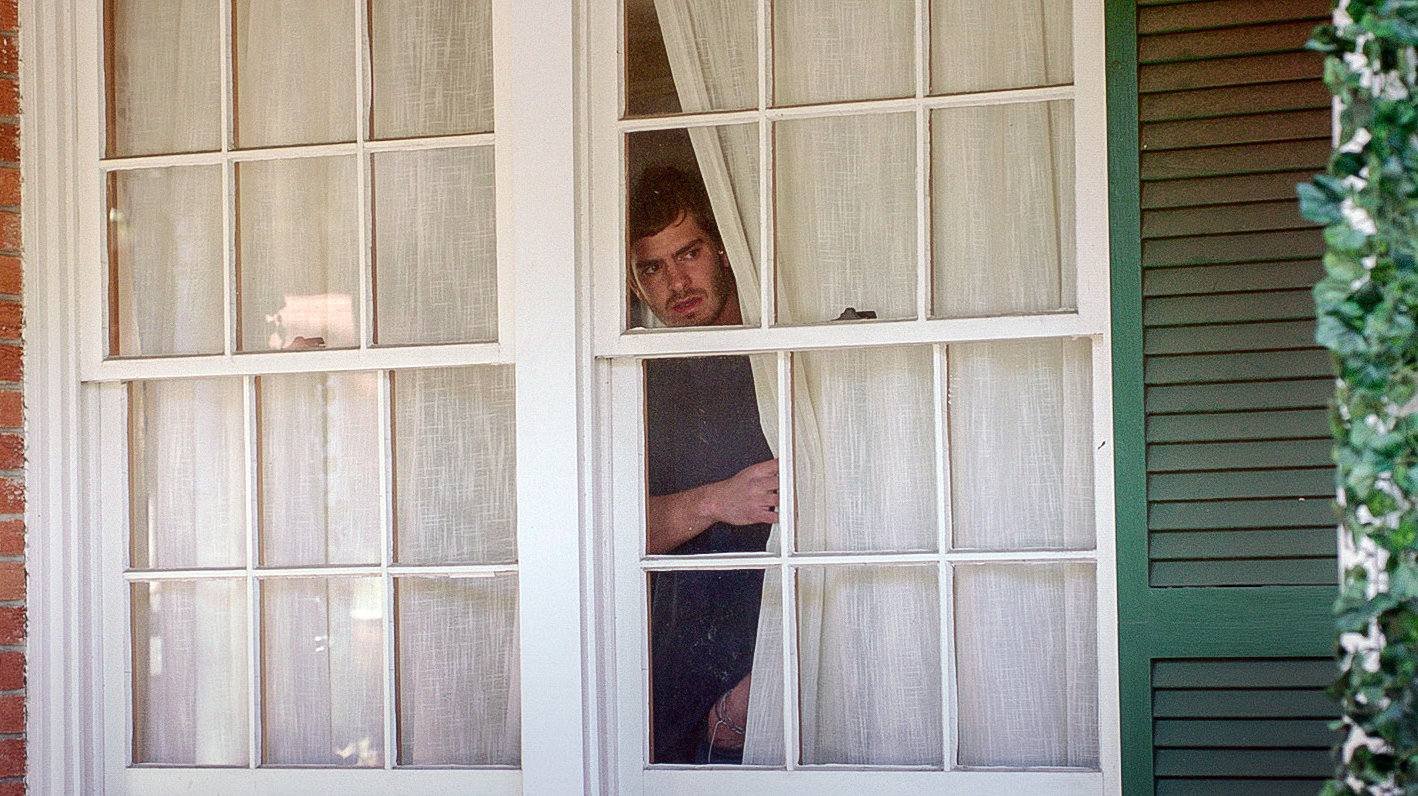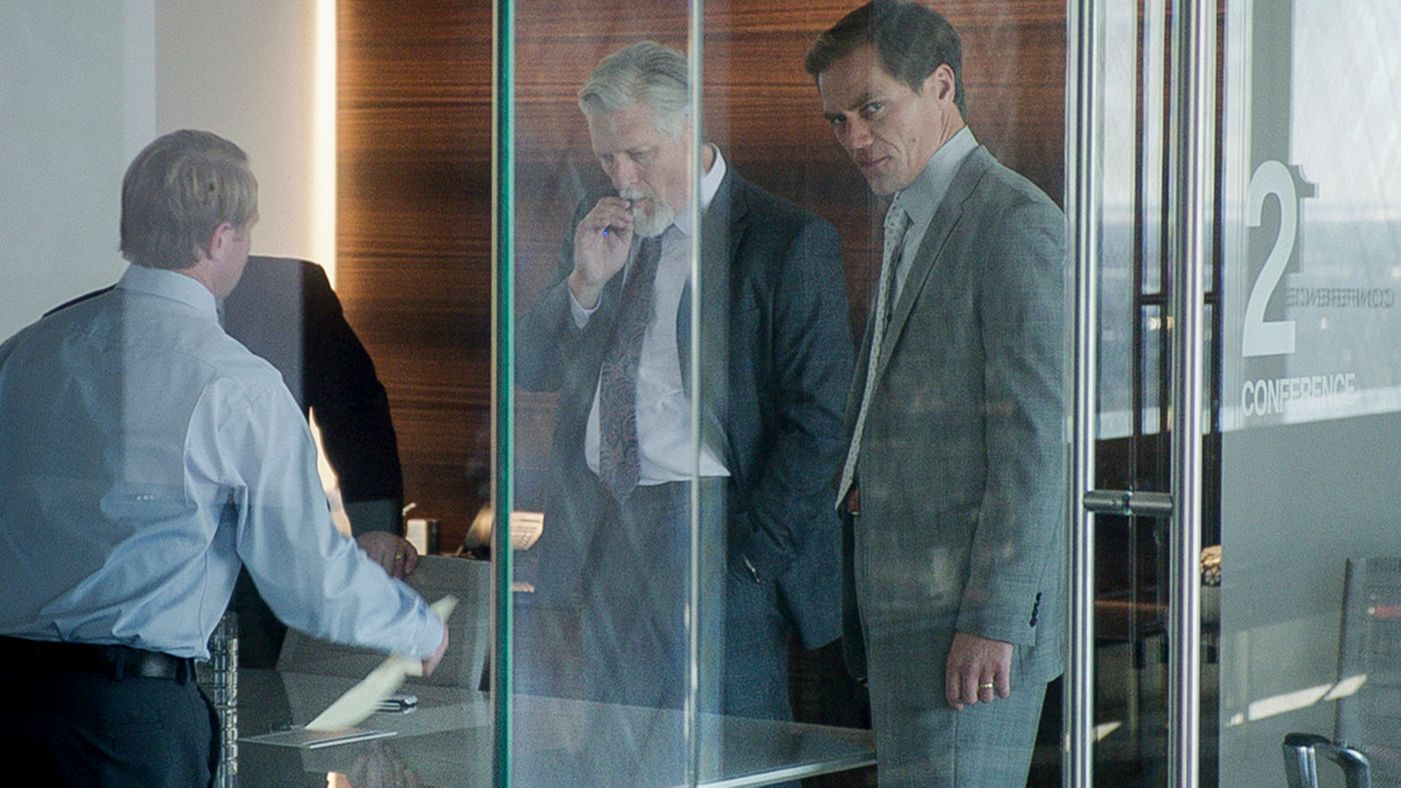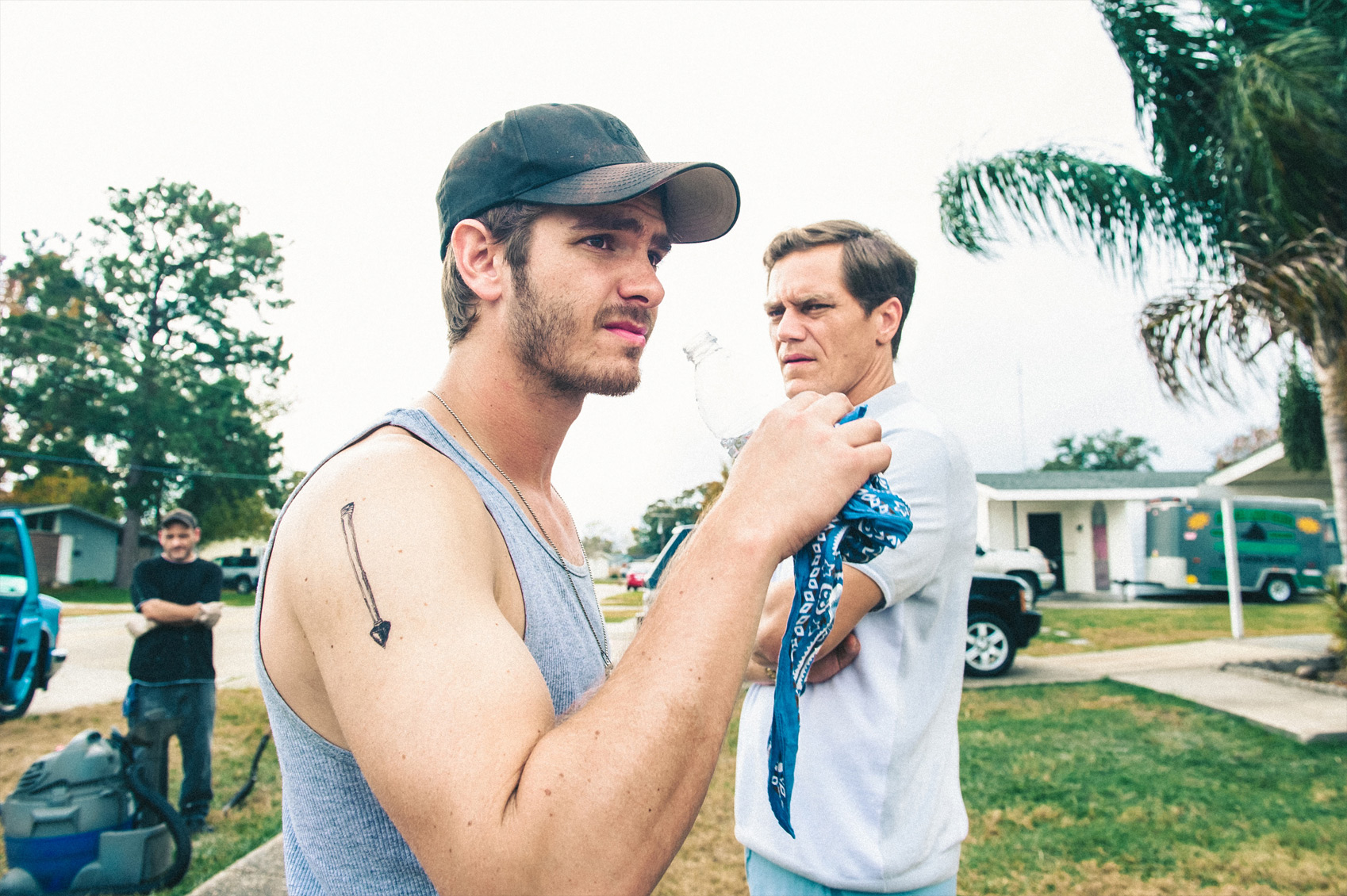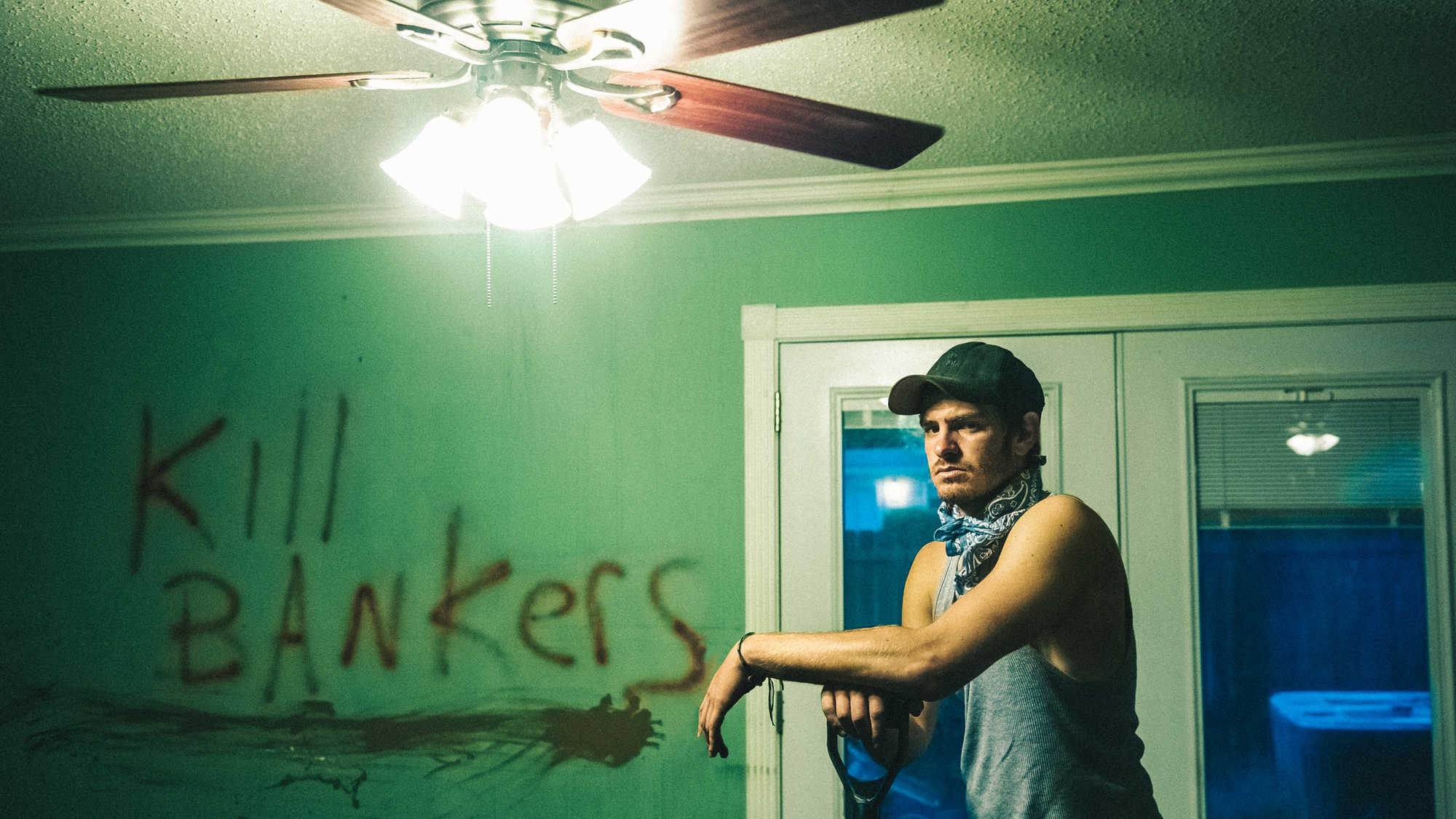Interview: ’99 Homes’ director Ramin Bahrani

One might not expect a film about property to be one of the year’s most compelling thrillers, but that’s exactly what you get with 99 Homes (in cinemas October 29). Andrew Garfield, Michael Shannon and Laura Dern star in this tale set in Florida amid the financial and societal chaos of a property slump and economic downturn. 99 Homes director Ramin Bahrani joined me on the phone for a an illuminating discussion about his film and the issues behind it.
FLICKS: You’ve captured a moment in time that obviously has a huge amount of impact on the people that are involved, and will reverberate down for quite a long time. When did you first become aware of the scale of the catastrophe that was happening to residential middle class Americans?
RAMIN BAHRANI: Well, the amazing thing was, it reverberated all the way to you! The whole world was turned upside down in the origin for the housing crisis here in the States. There were actually four states in particular that were the most ravaged, and Florida was one of them. I’m based in New York, I just started reading articles, probably three to four hundred articles, a lot of books, and then just made my way down to Florida, and spent weeks down there researching it on the ground. That’s a completely different story, because then you’re exiting the headlines that we all read. And we were all moved by them – six million people evicted, tens of millions more in deep financial trouble and hardship, – around the world but certainly here.
Once you went down to Florida, it was no longer a headline, it was in your face. It was very startling. I was surprised by a lot of things. I was surprised by the mind-boggling amount of corruption, of scams, from the highest level to the lowest level. I was surprised by the speed at which everything happened. Everything was so fast, and that’s probably why the film is so fast. In seconds, you lost your home, and then you were evicted, and then you were homeless, and then you were hungry, and then you couldn’t find a job, and on and on and on. I was very surprised that every single real estate broker carried a gun, that they were terrified what they were going to find when they knocked on the door. And I just wanted to find a way to connect the man being evicted to the man on the other side of the story, and that created this Faustian, deal-with-the-devil film. That structure was so solid that I thought I had something in my hands, and moved forward.

I’m cautious to make too fantastical a comparison, but thinking about the pace with which it happens to the individuals in the film, and the community as a whole, it reminded me of a zombie outbreak, or something. It’s this thing that’s happening behind closed doors, in residential communities, but just the speed of it is itself mind-boggling.
No, I don’t think it’s crazy to say that. When I was editing the Dennis Nash eviction scene, in my mind, I thought of it as a horror film, or as a rape sequence, a violation sequence. They have something called zombie properties here, too, so they use weird horror film terms even in the real estate industry. They have things like shadow inventory. They do have kind of horror terms for some of the properties that are still plaguing the nation now.
I suppose feudalism and frontier experiences as seen in the likes of ‘Deadwood’ are other things that spring to mind. We’re used to a veneer of modern civilization, but all of the screwing people over, and all of the quick collapse to misfortune, I think we pretend that those things have gone away.
Those things haven’t gone away. It’s so obvious that this is still happening now, in terms of deep, deep economic inequality. The crashes are only going to get worse, and happen in shorter amounts of time. Especially if the global economy gets more and more linked. Michael Shannon talks a lot about winners and losers in the film, he has a big speech. He references Donald Trump, and now all the critics in the states are talking about Michael Shannon as some kind of modern Donald Trump, a character even colder than Gordon Gekko. Many people say he makes Gordon Gekko look romantic. When you have Donald Trump leading in the polls, and he’s talking in this very divisive language of winners and losers– this is happening. This is for real, right now. And people are attracted to that because they’re freaked out and scared, and they can’t make ends meet and they’re looking for people to blame. They’re resting their hopes on phony dreams of becoming winners. That’s not going to happen. The system is so rigged, all over the world, and I think everybody knows it.
Auckland, New Zealand, has a ridiculous housing bubble. Without a doubt, it’s going to collapse, but no one really wants to take it seriously, because of all of the theoretical money that’s involved, and our whole economy’s resting on it. So watching 99 Homes was just a very terrifying glimpse of what’s just around the corner for us, to probably experience here.
I know that, I was there this summer for the film festival in Sydney. The journalists in the audience kept telling me, “Oh, my god, this is what’s about to happen here.” I believe it. Look, a poor middle-aged/elderly man in the screening had a seizure, and they had to stop the film and take him to the hospital. Thankfully, he’s okay. People better watch the film, because this is coming.

To focus on some of the more specific aspects of the film, and the performances in particular… you mentioned Michael Shannon. From an audience point of view, you sort of know what to expect when you go to see a film with Michael Shannon in a significant role. He’s going to bring an intensity, it’s going to be a very complex performance. For a director, do you have that same sense? Like, “Okay, Shannon’s coming to be in the film. I know what I’m going to get, and here we go. Holy shit, here it is…”?
I think he’s one of the greatest actors in the world. I think most people realize and know that. I had wanted to work with him since I met him in 2009 at the Venice Film Festival. I was on the jury, he was presenting a couple of Werner Herzog films, and I just grabbed him and said, “You are the greatest in the world, I’ve got to work with you.” Thanks god he said yes. He just added so many things to the role. He understood very quickly that the real villain in the movie is the system, not him. He understood very quickly that no child in kindergarten raised their hand and said, “I dream to do evictions one day, teacher.” You know?
It became his job, and he understood how lonely the character was. He mined certain things, like how companionship — I don’t want to say friendship, but a companion like Andrew, an apprentice like Andrew — it’s not just that he does work for him, and he can use him for work, and to make more money. He can also justify his own behavior through that character. Michael really understood that. I think there’s a quote from Nietzsche where he talks about how a man can despise himself, but still honor the thing within himself that makes him despise himself. And Michael could get to things like that, and bring them out of the character in ways that were more than what I had written. He’s very good at that. And he always had great improvisational lines.
Andrew, a very different actor, also an amazing actor, very dedicated, delivers an amazing performance. And very loose, very improvisational. Michael less so. But the funny thing was, it was actually Michael who was really good at improvisation. He kept adding these great little lines that added sometimes a lot of humor to the scenes. He’s got a very good sense of humor, actually, and he and I are working on a lot of things now. One is going to be a TV series, so I really want to draw all of that humor out of him, and show the completely different side of him. He’s just an endlessly good actor.

The relationship that he has on-screen with Andrew, as you say, is a very interesting one. It’s not really a friendship, it’s not even necessarily like a master and apprentice. There’s plenty of people that Shannon’s character could’ve drawn upon to be his lieutenant in the business. None of these guys really have an end destination in mind, other than to try to scramble with the cards that they’ve been dealt. For Andrew’s character, it’s super rough. I think the first sign of that is just what a complete performance he offers as the shit’s hitting the fan in the first 15-20 minutes of the film.
Yeah. Oh yeah. When you see the eviction sequence, for me it’s actually really hard to remember that Andrew and Laura Dern are actors. I just assumed they’re going through it. He was very dedicated. You know, it’s amazing, you’re happy as a director, because you’re like, “Wow, this guy’s so talented, and you’ve got him in his first leading role as a man. And you can help craft that with him.” That was exciting. Him and Michael are very different in their styles, so that was exciting because there’s a lot of electricity on set, when they were together. They respect each other, as the characters do, which was important, but they have very different styles, and that resulted in opening the gate to two bulls that just ran into the ring and smashed into each other, over and over and over again for two hours. Pretty fucking exciting to watch. Even as the director, it was exciting to watch.
I bet. That brings a natural chemistry to the scenes, right?
Very much. It was just obvious on set. Normally, as a director, you don’t know what’s happening until the edit room. Here it was just obvious there was something good happening between them. And you know, talking about that eviction scene, one of the reasons that it elevates is, that’s a real sheriff. He’s an actor, but he’s really a sheriff in real life, and he’s done evictions, and he’s done a lot of them. And that added an intensity and an authenticity to the scene. The clean out crew, the people that throw the stuff to the curb, one is an actor, the other four are real clean out crew people, that’s what they do for a living. When Andrew was knocking on doors evicting people later in the film, every other person was a real person, actually in their real home, and Andrew never knew who was real, and who was an actor. And he never even knew what was going to happen when he knocked on the door. He didn’t know if it was a Hispanic family that didn’t speak English, was it a man with a gun, was it an old man that didn’t have anywhere to go and was confused, didn’t even know what was happening. He just didn’t know, he’d have to deal with it as it happens. And that adds a real authenticity to those scenes.
What a great strategy. You described Andrew’s role as his first role as a man, and a really minor thing, but something that I really, really liked about the film early on, was seeing a familiar face know his way around some tools! Which sounds like a silly thing, but considering his filmography to date, it was like, “You know what? I right away believe that you worked on building sites”. , I wasn’t sure that I was going to buy him as an American tradesman.
He was working with the accent for months, he never broke from the accent. After the film wrapped, I didn’t see him for a few months until he came to talk about the editing, and he was speaking with a British accent. I honestly was confused. I’d totally forgotten that he didn’t speak the way he speaks in the film. It had been months that he had not broken the accent for. And he likes doing work with tools on his own. He spent time with real construction workers. Him and Michael went down to Florida, they also did research. I connected them to people I wanted them to meet. And those scenes, for example, in the opening of the film, where he’s building a home– that’s not really a set, that’s a real home being built, and those are the real people who work there. And I just threw him into the environment. Of course, we did it with safety and precaution, but that’s a real live environment with real construction guys. And he held his own there.
Excellent. So he’s future-proofed, just in case the acting thing doesn’t work out then.
Yeah, the second career. No doubt about it.
The film casts a powerful spell over the viewer. In part, the very real fear this could happen to you, the outstanding performances, and also, as you say, from the authenticity.
I’m guessing one of the things that draws people in is– other than the pace and the thriller aspect of it– is, you’re surprised by what’s happening. You see what happens to Andrew, and you see what Michael’s doing, and a lot of people are like, “Poor Andrew, poor Laura, and my god, that Michael’s a horrible person.” And 30 minutes later, you don’t know what to think anymore. Because Andrew’s doing things that you never thought he would do, and that you never thought you could do as a person. You have a different perception of Michael because he’s slowly revealing things about himself that surprise you, as an audience. And I know a lot of people who’ve seen the film that say, by the end they actually don’t know who was right or wrong, and they don’t know what to think anymore. And I like that, because I don’t know either. And I don’t have the answers, but I’ve got a lot of questions. And the way you’re describing it, from what I heard and read when I came to Sydney over the summer, you guys are going to have a lot of questions pretty soon. I think you should start asking the questions now, before it’s too late.
Some of us are trying to have that conversation! I think another very interesting thing, after making the comparison to Gordon Gekko, to Wall Street, is that while you’re rooting for Andrew’s character to get out of his immediately desperate situation, there’s not a huge amount of wish fulfillment to go along with it, you know? Normally with a film where someone’s embracing their dark side and being taken on a journey into that, there’s a part of you that’s like, “I know I shouldn’t really like this, but I’m kind of cheering for them as well.” And it’s really difficult– apart from Andrew getting out of his immediate difficulties, it’s really hard to cheer for much that he does on his journey. So it makes that a little bit of a different viewing experience.
The most you can do is you hope that he can get a home for his mom and his son. I don’t want to name them, but we know which films have already been made that, I don’t want to say celebrate, but certainly show a lot of glitz and glamour about people who made hundreds of millions of dollars off the backs of the rest of the world. There’s another one coming. I don’t really need to see that. I don’t really need to see that. This film includes homeowners who were greedy. But I think we all know this was not the majority. The amount of massive fraud that was happening, very well documented, those people didn’t go to jail. The people in the banks, who made hundreds of millions of dollars, and then were bailed out by me, the taxpayer, those people didn’t go to jail.
Instead, the people in charge became my “representatives” in the secretary of treasury and the head of the Federal Reserve Bank, and then returned to the private banks that are making money off of pillaging and cheating the world. When the Libor scandal hit, banks were fined 5 billion dollars, but they made billionfold more, and no one went to jail. I don’t need an MBA from Harvard to know that this is a rigged system, and I’m being cheated. And the whole world is being cheated. As a film maker, I don’t really want to show people driving Lamborghinis and flying on private jets, and making ten million dollars a month, when I know what happened underneath it, which is what’s in the film. 99% of the world getting destroyed. I don’t need to glorify that. Hollywood has plenty of money to do that without me, and there are plenty of people who have the time to make that film, but it’s not me.

It’s interesting that you mentioned Libor. Our Prime Minister, John Key, he was a former currency trader at Merrill Lynch.
[Laughs]
His nickname with Merrill Lynch in the US was, he was nicknamed The Smiling Assassin, for the way he would lay off workers.
Please keep going, this is so good.
So, he’s presiding over this housing boom. he’s been Prime Minister here for eight years. So he came out of a really mucky period in the international financial market. But the funny thing is, I guess a bit like Wolf of Wall Street, which is what you’re alluding to, is that, he’s sort of held up here as a guy who made heaps of money, and didn’t he do well? And it’s like, no, you were involved in some really dodgy shit.
I didn’t realize that was the situation.
Yeah, you’re in a mess, then.
You’re in a real mess.
And he’s just now celebrating the signing of the Transpacific Partnership Agreement, like, oh, here we go. It’s just going to roll on into another phase.
You know, Clancy Brown’s character in the film – the gentleman in that skyscraper that’s doing the bulk buying, bulk buying’s a big issue now – that’s based on a real guy. He was Fannie and Freddie’s number one attorney, doing 40,000 foreclosures a year for three-four years in a row– totally running a fraud mill in his office. Took his company public, sold it to Chinese just before the crash. Made god knows how many tens of millions of dollars, even bought a yacht he called, “Mi casa es su casa”. His wife forced him to change it to “Misunderstood”. Mother Jones broke the story on him. Ten years or so later, he was finally disbarred, never went to jail, never lost his money. Walked away a “winner”. Winners and losers, like Michael says in the film, Donald Trump is trying to get himself elected with language like that, about winners and losers. The country and the world is much more than winners and losers.
Absolutely. If there’s one question that a struggling homeowner in New Zealand should ask our currency trading Prime Minister, about their own economic security, what do you think it might be?
Man, you better get into the paperwork. It sounds dull and boring, but if you own your home, you better start looking at the paperwork. Because when the crash hits, you’re going to be under water, which is what Andrew is in the film. That means you’re going to owe more on your home than it’s worth. That means you’re on a very sharp downward slope towards nothing. It’s not like a gradual thing, you claw your way back. It’s a steep slope when you’re under water. A lot of the paperwork, at least on this side of the pond, had a lot of fraud in it. I would tell people, you better start looking at the paperwork now.
And, if it’s anything like here, assume that there’s going to be corruption at every level. Here, no one got a fair trial. The trials were all– I don’t want to say all rigged, but they were certainly heavily, heavily weighted to one side. They were called the Rocket Dockets, I saw it. It’s in 60 seconds, your case is decided. I was there when there was a Hispanic man with an interpreter. The judge said, “Who are you?” He said, “I’m the interpreter.” The judge then asked, “How long this man has been in the country?” he said “Five years.” Then the reply was “I don’t have time for you.” And in 60 seconds, that man was out, and literally couldn’t understand what was happening. And that judge has not been elected, he was assigned to that position, because there were so many foreclosures, they had to bring more judges in. So he wasn’t beholden to anyone in the community, he was just there. I don’t need to tell you the judges that were there, who was paying for their reelection. It certainly wasn’t the homeowner’s lawyer, because they didn’t have lawyers. They couldn’t afford them. I’m sure you know who did afford lawyers. Big banks.
All I’ve got is a sigh at this point.
[Laughs]
Good chat, I’d say great. But now I’m left scratching my head a little bit. Thank you for making such a fascinating film. See you on the other side of the economic wasteland.
Yeah. Well get people to see it, because I’d love for it to be a warning to them.
’99 Homes’ movie times and more info



















